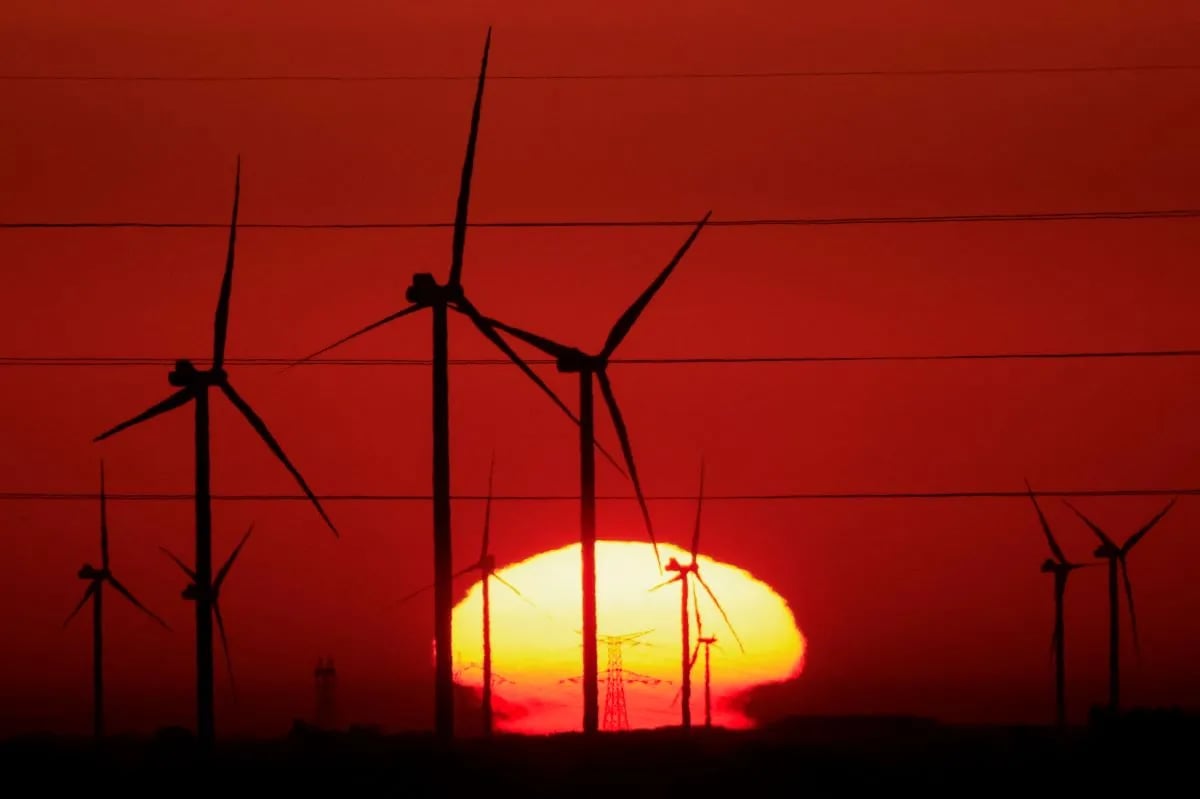What to do about climate’s front-page paradox?
We know the solutions to climate change, yet we are still failing to put them into practice
Christiana is a Founding Partner of Global Optimism, co-presenter of climate podcast, Outrage + Optimism, and co-author of The Future We Choose: The Stubborn Optimist's Guide to the Climate Crisis.
Published
16 September 2023

Originally published 15 September 2023 in Context

Power-generating windmill turbines and electricity pylons are pictured during sunrise at a wind park in Avesnes-le-Sec, France, September 8, 2023. REUTERS/Pascal Rossignol
-------------------------------------------------------------------------------------------------------------------------------
Christiana Figueres is founding partner of Global Optimism and former UN climate chief.
In years to come, historians will be bewildered about what we might call the ‘double climate paradox’ we are witnessing today. Flush with evidence, drowning in solutions, offered multiple options, consistently on page 1 of the Financial Times – they will ask: why did global leaders at the G20 meeting in 2023 not move faster, further, sooner to tackle the climate crisis? What did the UN General Assembly or COP28 do to remedy the situation?
Just a few years ago, we had no way of knowing that 2023 would bring temperatures higher than in the last 120,000 years. The world is getting exponentially hotter, exacerbating wildfire risk and shrivelling crops, and droughts are slowing down maritime routes such as the Panama Canal, while elsewhere unprecedented downpours wash away infrastructure and livelihoods.
At the same time, paradoxically, the clean energy solutions are becoming exponentially cheaper and more accessible globally. Wind energy costs have dropped 60%, solar energy costs have dropped 80%. Just those two renewables are set to represent 30% of global power by 2030. Look at the cost curves (in this RMI document) for offshore and onshore wind, solar, batteries and so on.
Late on Sept. 8, in a 30-plus page document, the UN delivered the most extensive review of global climate action to date. The Global Stocktake (GST) was built on two years of consultations with nearly 200 governments, thousands of businesses, and a legion of engineers, farmers, economists, scientists and indigenous communities from around the world.
The findings are blunt - and they are no surprise: we have known for a long while that we are far off track to achieving the long-term goals of the Paris Agreement. The Paris Agreement can be understood as a business plan to decarbonize the global economy, in order to protect our wellbeing, but like any business plan, if it is not financed and executed, it is good for nothing.
Out with fossil fuels, in with renewables
With few shining exceptions, governments around the world continue to prevaricate. Policies to prevent any new oil and gas investments should have been on the table since the International Energy Agency mandated their end in 2021.
If not then, now. Incentives to invest in solution technologies and protect nature from a just transition perspective should have been enacted years ago. If not then, now. Decisions to reform international development finance should have been taken last year when the Bridgetown agenda was proposed. If not then, now.
With some recognizable exceptions, corporations and financial institutions are cowering to vitriolic partisan accusations and phantom legal threats. Where is the backbone of responsible entrepreneurship? Floods, droughts and extreme weather are overwhelming existing defences and undermining growth. Are they going to sit on the sidelines and see our potential prosperity vanish?
For all the complexities of climate change, the big picture of what we need to do is not rocket science:
- Turbo-charge investments into all clean energy alternatives: wind, solar, geothermal, batteries, green hydrogen, and green mobility.
- Enact a global moratorium on all new oil and gas exploration and exploitation, encouraging oil and gas companies to shift their business model.
- Regenerate nature.







